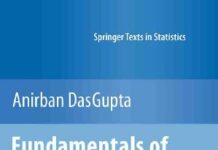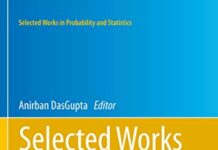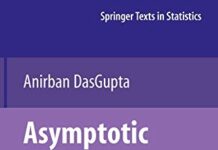
Ebook Info
- Published: 2011
- Number of pages: 796 pages
- Format: PDF
- File Size: 5.17 MB
- Authors: Anirban DasGupta
Description
This book provides a versatile and lucid treatment of classic as well as modern probability theory, while integrating them with core topics in statistical theory and also some key tools in machine learning. It is written in an extremely accessible style, with elaborate motivating discussions and numerous worked out examples and exercises. The book has 20 chapters on a wide range of topics, 423 worked out examples, and 808 exercises. It is unique in its unification of probability and statistics, its coverage and its superb exercise sets, detailed bibliography, and in its substantive treatment of many topics of current importance.This book can be used as a text for a year long graduate course in statistics, computer science, or mathematics, for self-study, and as an invaluable research reference on probabiliity and its applications. Particularly worth mentioning are the treatments of distribution theory, asymptotics, simulation and Markov Chain Monte Carlo, Markov chains and martingales, Gaussian processes, VC theory, probability metrics, large deviations, bootstrap, the EM algorithm, confidence intervals, maximum likelihood and Bayes estimates, exponential families, kernels, and Hilbert spaces, and a self contained complete review of univariate probability.
User’s Reviews
Reviews from Amazon users which were colected at the time this book was published on the website:
⭐Firstly, let me say that I gave the book one star, so it would average 3 stars. The only other review of this book, which is written by a Purdue professor, is by a Purdue graduate student. He gave the book 5 stars, which I think is overly enthusiastic. Why was he overly enthusiastic, you will have to draw your own conclusions.Firstly, unless you are very happy with the kindle medium, this is not the book for you. It lacks a TOC, which is a huge drawback. There are a certain number of links to figures that work, but navigating through the book is hard. I’ve read a number of books on kindle, but I still prefer paper because of this issue of ‘flipping through’ to find something. Beware, this book is only for people who are very okay with the kindle medium. I found navigation particularly difficult.I have only read the section on martingales so far. I have no issues with measure theory (I have a math phd and I actually learned analysis from Zygmund !), but I think the idea of keeping the measure theory out of the exposition is an excellent one. For all but the most serious students of analysis, the measure theory aspect of the subject is a formalism and it just adds confusion. Having said that, I found the exposition to be decent but not crystal clear.
⭐I strongly recommend this book as a reference book for those who apply probability theory in their work: computer scientists, applied statisticians, industrial engineers and so on. This book is very comprehensive: in every topic this book discusses, from very basic undergrad facts to modern probability theory results are all covered. What is remarkable, is that Prof. DasGupta has managed to explain all of these in very high level, avoiding messing up the intuitive message with mathematical jargons. In particular, he avoids the use of measure theory as much as possible, and it is amazing that such a comprehensive book on probability can be written with this much use of measure theory! Therefore, for non-probabilists this is an wonderful reference to extract useful results and intuition from probability theory, without investing too much time on struggling with mathematical techniques. For hard-core mathematics people, this is still a good book for both learn and reference, but for rigorous proofs you should follow the reference given in the book.
⭐Buyer beware.This may be another probability / statistics text with Machine Learning, or Data Mining, or Flavor of the Month added to the title to boost sales. I have perused the pdf version available through my school’s library, but I have not had the text for a course or worked through it. It appears to be a fine text on probability and statistics, but what came to my attention was the apparent lack of any real intention to show how statistical techniques are addressed and used in machine learning application. Chapter 20, Useful Tools for Statistic and Machine Learning, could just as easily had Machine Learning dropped from the title and no one would have noticed. A search of the term “machine” through the pdf doesn’t come up until chapter 10 and 11 and then barely again until later chapters, and often only as something as follows: “technique xyz has lately become important to the machine learning community.” In my opinion, machine learning appears to have been an afterthought.My point is simply review the contents of the text before buy and know what you are getting.
⭐First, When I purchased this book I did so directly from Springer because it was out-of-stock on Amazon, hence lack of verified purchase. But, I want to leave a review because lets be honest Amazon is really the best place to leave a review.This is my go-to probability reference. It is just littered with tons and tons of my own handwritten notes in the margins and I cannot imagine working on my day-to-day applications in probability without this text by my side. Please note, this is certainly a graduate level text even despite the lack of measure theory.I think “Applied probability” is a much more fitting title than “…for statistics and machine learning”. Don’t buy this expecting lots of coverage for the latter two subjects. Seems like it was more of a marketing tactic by the publisher because the topics covered are bare minimum like kernels, bootstrap, and EM.Also, for such a comprehensive text strongly geared towards applications it is disappointing that at copulas and point processes were not covered. That’s not too much criticism on my part, Nelsen for copulas and Cox/Isham for point processes are well established and near-perfect references. So, the book is almost everything you need to know for applications, minus two important topics.All that said, I love this book so much that I personally emailed the author to thank him for writing this text. Please buy it!
⭐This is a strong textbook with an emphasis on the probability tools necessary for modern research. Indeed, machine learning is becoming a more powerful tool in academic research, but the underlying theory remains esoteric. If you wish to use any form of machine learning, then you should understand exactly how the algorithms work. To be fair, most machine learning texts omit the theoretical justifications for the algorithms. This has led many researchers to misuse machine learning or to overstate their success. I believe it is a general ignorance of the underlying probabilistic and statistical concepts that have led to the many errors and outright lies of the average machine learning practitioner.Therefore, if you are serious about understanding machine learning and using it properly – either for your research that uses machine learning or research in statistical learning theory – then the concepts in this book are essential prerequisites.
Keywords
Free Download Probability for Statistics and Machine Learning: Fundamentals and Advanced Topics (Springer Texts in Statistics) 2011th Edition in PDF format
Probability for Statistics and Machine Learning: Fundamentals and Advanced Topics (Springer Texts in Statistics) 2011th Edition PDF Free Download
Download Probability for Statistics and Machine Learning: Fundamentals and Advanced Topics (Springer Texts in Statistics) 2011th Edition 2011 PDF Free
Probability for Statistics and Machine Learning: Fundamentals and Advanced Topics (Springer Texts in Statistics) 2011th Edition 2011 PDF Free Download
Download Probability for Statistics and Machine Learning: Fundamentals and Advanced Topics (Springer Texts in Statistics) 2011th Edition PDF
Free Download Ebook Probability for Statistics and Machine Learning: Fundamentals and Advanced Topics (Springer Texts in Statistics) 2011th Edition


